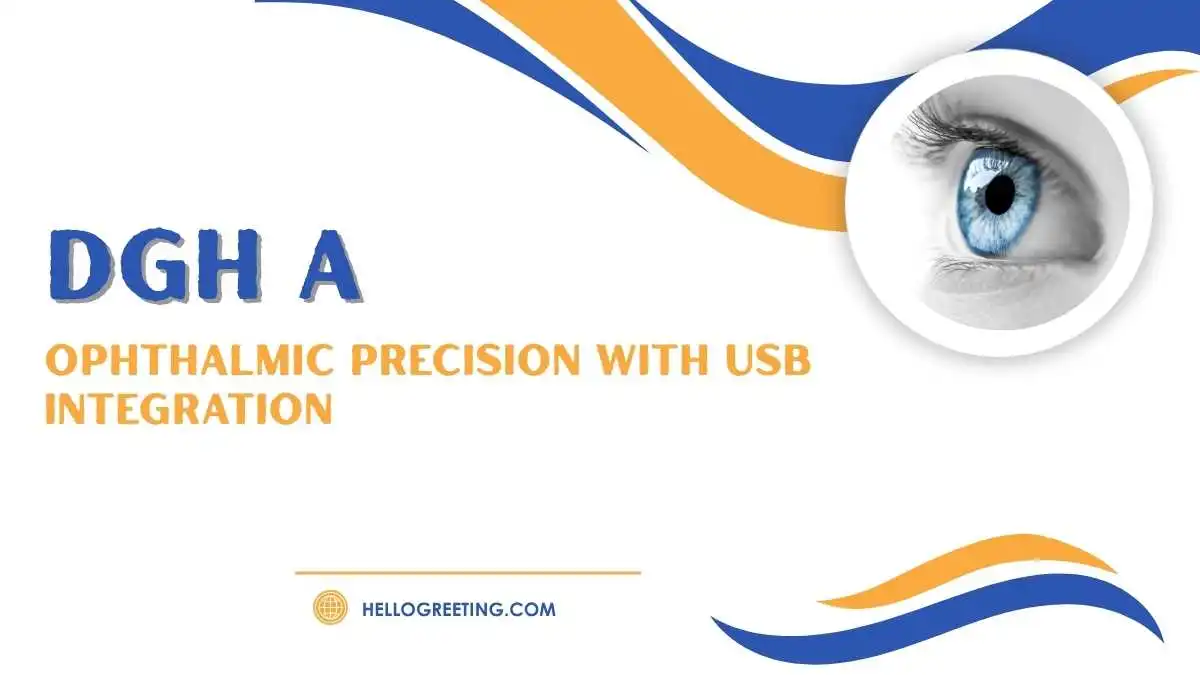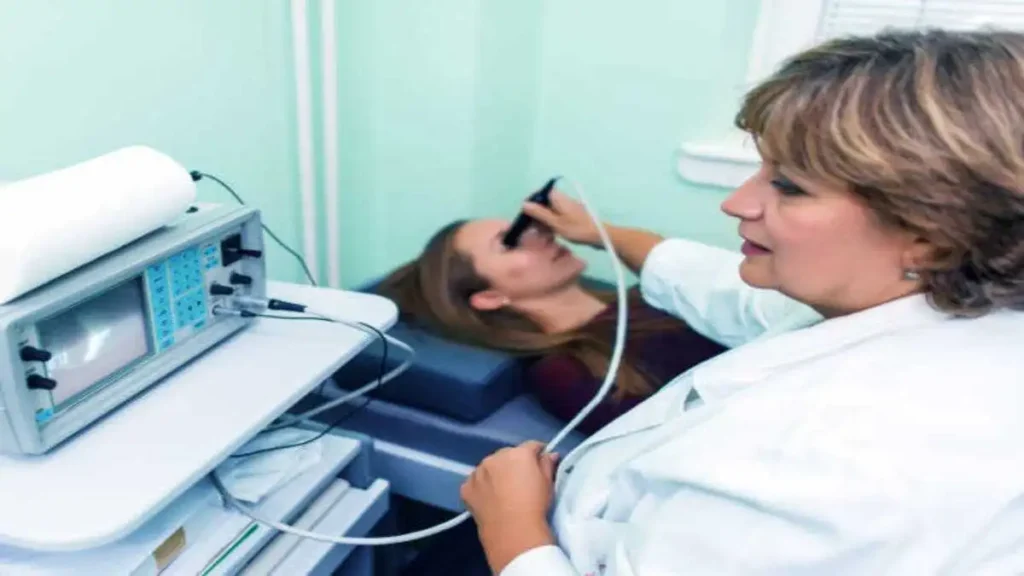HEALTH AND FITNESS
DGH A Compact A-Scan: Ophthalmic Precision with USB Integration

Accuracy is critical in the area of ophthalmology. Ophthalmologists use sophisticated diagnostic devices to diagnose eye conditions, surgery (cataract removal or intraocular lens (IOL) placement). The A-Scan ultrasound biometer is one of these tools, and the DGH A or DGH 6000 Scanmate A is a benchmark in this family.
Table of Contents
Introduction to DGH A
The DGH A or DGH 6000 Scanmate A-Scan ultrasound biometer is the new state-of-the-art in the DGH line of diagnostic equipment. The gadget has been created by DGH Technology, Inc., the leading manufacturer of ophthalmic diagnostic devices, and is specifically intended to provide accurate biometric measurements required to draw appropriate IOL power calculations and preoperative planning.
The DGH A is fairly compact and is powered by the standard USB connection with no external power supply needed, which makes it very portable and efficient. The fact that it provides a direct connection with any PC based on Windows increases flexibility and convenience within clinical environments.
Core Features of the DGH A
1. Compact and USB-Powered Design
DGH A is designed to be portable and convenient. USB powered nature saves it of such a huge power source, and its overall functioning is lightweight, which can easily be relocated to examination rooms or other distant sites.
2. High-Resolution 10 MHz Transducer
It has a high-resolution 10MHz transducer, which means a lot in ensuring clear and consistent signal acquisition. This guarantees imaging and precise measurement at a high level of detail, even under difficult ocular conditions.
3. Exceptional Accuracy and Repeatability
Another incredible feature of this device is that it is highly repeatable with a precision of +0.03mm in immersion mode. This accuracy is crucial in the measurement of the axial length, particularly among patients who need multifocal or toric lens surgery, because any minor errors may interfere with surgical outcomes.
4. Immersion and Contact Modes
The device supports both contact and immersion modes of measurement, offering flexibility for practitioners based on patient needs and operator preference. Immersion mode is generally recommended for its superior accuracy by avoiding corneal compression.
5. Windows PC Integration
With seamless Windows PC integration, DGH A offers an intuitive user interface that allows quick access to patient records, real-time visualization of waveforms, and straightforward data storage. It supports DICOM compatibility and EMR system integration, streamlining workflow and record management.
6. Customizable IOL Power Calculations
The system includes advanced software algorithms to perform IOL power calculations using established formulas such as SRK/T, Holladay, and Hoffer Q. This aids in delivering more personalized patient care by improving refractive outcomes post-surgery.

Key Ophthalmic Measurements
DGH A specializes in the following crucial ophthalmic biometric measurements:
• Axial Length (AL)
Measured from the corneal surface to the retinal pigment epithelium, axial length is the most critical factor in determining IOL power. With its high-frequency transducer and immersion mode capability, the DGH A ensures superior accuracy for this measurement.
• Anterior Chamber Depth (ACD)
The anterior chamber depth refers to the space between the cornea and the anterior lens capsule. A precise ACD measurement helps in determining phakic IOL placement and assessing glaucoma risk.
• Lens Thickness (LT)
Lens thickness plays a significant role in IOL power calculations, especially for eyes with extreme refractive errors. DGH A captures this with remarkable clarity and repeatability.
Advantages of DGH A
DGH A offers numerous benefits, making it a preferred choice among ophthalmologists and optometrists:
| Advantage | Details |
| Portability | USB-powered and lightweight, ideal for mobile diagnostics |
| Accuracy | ±0.03 mm repeatability in immersion mode ensures consistent results |
| Versatility | Supports both contact and immersion scanning techniques |
| Ease of Use | Simple software interface with real-time waveform analysis |
| Data Management | EMR and DICOM compatible for seamless record-keeping |
| Cost-Efficiency | Eliminates the need for standalone monitors or power units |
Clinical Applications
The device works best in different clinical and surgical premises:
- Cataract Surgery Planning: Aids in calculating the power of the IOL accurately
- Refractive Surgery Evaluations: Refractive surgery evaluations are necessary to measure before LASIK or PRK to determine biometric readings
- Glaucoma Monitoring: Measures the depth of the anterior chamber to determine risk
- Pediatric Ophthalmology: Lasts in Biometric tracking of children
- Mobile Eye Clinics: It is a compact structure designed to assist in remote or rural healthcare outreach initiatives
Ease of Operation and Training
DGH 6000 Scanmate A is designed to be user-friendly. With minimum training, medical staff can become skillful. Real-time waveform display can be used to view the quality of measurements, which saves the trouble of having to scan again. In addition, DGH provides full technical assistance and software refreshment to pursue long-term operational effectiveness.
Maintenance and Durability
Another advantage of high-volume clinics is that the device does not need much maintenance. It is constructed of hardy materials and designed to be dependable. To wash the transducer between patients is easy, and since USB-probably only a few mechanical parts exist, where limited glass to be broken or soldered components to break.
Comparison with the Conventional A-Scan Biometers
Though the conduct of regular A-Scan biometers is usually a case of a high, bulky gadget, which necessitates the use of numerous cables, individual power supplies, and a messy setup, DGH A simplifies the procedure. It does not highly complicate the process of working with it, as all that is needed is just to connect it to a PC using USB, and the operator will have access to advanced biometry with the minimum of mess, thus it is a great addition to the clinics that want to modernize their diagnostic base.
Conclusion
It is not only a tool, but rather a game-changer in terms of ophthalmic measurement technology with its high-resolution 10 MHz transducer, repeatability of every 0.03 mm in the no-touch immersion mode, and seamless integration with Windows PC. Investing in such a biometer will help clinicians move towards a higher quality of eye care they provide, higher precision, the likely outcome, and patient satisfaction.
Fuel your feed — find more at Hellogreeting.
-

 FRIENDSHIP MESSAGES4 months ago
FRIENDSHIP MESSAGES4 months ago100+ Heart Touching Sorry Messages for Friends
-

 ANNIVERSARY WISHES8 months ago
ANNIVERSARY WISHES8 months ago100+ Beautiful Engagement Anniversary Wishes Messages and Quotes
-

 BIRTHDAY WISHES7 months ago
BIRTHDAY WISHES7 months ago300+ Happy Birthday Wishes for Brother | Heart Touching Happy Birthday Brother
-

 BIRTHDAY WISHES8 months ago
BIRTHDAY WISHES8 months ago200+ Unique Birthday Wishes for Your Best Friend to Impress on Their Big Day




















